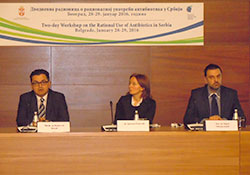Serbia joins global efforts to reduce antimicrobial resistance

SSHP
The Ministry of Health of Serbia announced the development of a national strategy and action plan to reduce antimicrobial resistance (AMR) in accordance with WHO's global action plan on AMR.
The announcement took place at a two-day workshop on the rational use of antibiotics held in Belgrade, Serbia on 28–29 January 2016, as part of the Second Serbia Health Project. International organizations including the European Centre for Disease Prevention and Control, the Health Insurance Institute of Slovenia and WHO participated in the workshop.
The workshop was an opportunity for experts from clinical centres in Belgrade, Novi Sad, Niš, Kragujevac and other tertiary health care institutions to share their experience and challenges regarding AMR, as well as present an analysis of data on AMR in Serbian health care institutions.
Irrational use of antibiotics
Professor Dr Berislav Vekic, State Secretary of the Ministry of Health, pointed out that 5.14 million boxes of antibiotics were consumed in 2015, meaning that 29 out of 1000 people in Serbia take antibiotics every day. Tested bacteria strains from Serbia showed a high level of AMR, consistent with other countries in south-eastern Europe.
In welcoming the participants, Dr Miljana Grbić, Head of WHO Country Office in Serbia, highlighted Serbia's commitment to working on the first strategic objective of the AMR global action plan: to improve awareness and understanding of AMR.
Dr Danilo Lo Fo Wong, Programme Manager, AMR at WHO/Europe, spoke about the global issues of AMR, presented the strategic objectives of the global action plan, which was adopted by WHO in 2015, and gave an update on the AMR surveillance activities in the WHO European Region.
Clinical experts highlighted the need:
- to develop national best practice guidelines for the use of antibiotics
- to strengthen capacity of national reference laboratories for etiologic diagnosis of hospital-acquired infections
- to provide additional training for health care professionals.
The ongoing national campaign on the rational use of antibiotics, launched by the Ministry of Health in November 2015, is aimed at citizens and primary health care physicians who prescribe medications, as well as secondary and tertiary health care doctors, pharmacists and representatives of the media.
About the Second Serbia Health Project
The Project aims at improving the efficiency and the quality of Serbia's public health care system. It is implemented by the Ministry of Health of Serbia and funded by the World Bank.



